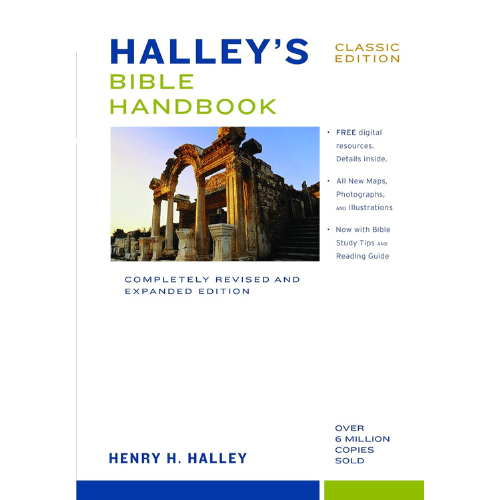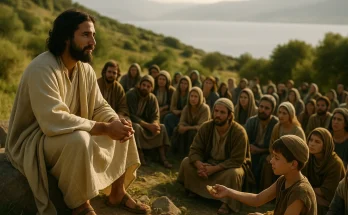A Story That Demands a Response
What if one story could change how we view life, death, and eternity? In Luke 16, Jesus shares a powerful warning wrapped in a vivid tale — the parable of the rich man and Lazarus. This wasn’t just a lesson for His day. It still speaks to us now, challenging how we live and what we value.
Parables: The Mysteries of God’s Kingdom Revealed Through the Stories Jesus Told by John MacArthur
At this point in Luke’s Gospel, Jesus had been teaching about wealth, faithfulness, and the eternal consequences of our choices. He knew how easily riches could blind us to what truly matters. So, He told a story — a stark contrast between a rich man feasting in luxury and a poor beggar named Lazarus suffering at his gate.
Like many of Jesus’ parables, this one uses contrast to reveal spiritual truths. The reversal that takes place after death grabs our attention. Yet this parable does more than inform — it invites reflection.
This isn’t just a tale about two men. It’s a mirror for us. The parable of the rich man and Lazarus forces us to ask: Who are we becoming? Will we be people of mercy and faith, or will we miss what matters most?
Let’s step into this story together and wrestle with the question: Who will we be?
The Earthly Contrast: Two Lives, Two Realities
In the parable of the rich man and Lazarus, Jesus opens with a vivid contrast. One man lives in luxury — clothed in purple and fine linen, feasting every single day. His life is full of ease, wealth, and status.
Just outside his gate lies Lazarus. This poor man is covered in sores and longs to eat the crumbs from the rich man’s table. Instead of help, he’s met with silence. Even the dogs show more kindness by licking his wounds.
God Sees Differently
Interestingly, the rich man has no name, but Jesus names the beggar—Lazarus. That name means “God has helped.” The world may have ignored him, but heaven didn’t. This tells us something vital: in God’s eyes, the nameless may be known, and the unseen may be honored.
Jesus is already challenging our assumptions. Outward success does not equal spiritual favor. Suffering does not mean abandonment.
Blindness at the Gate
The rich man isn’t portrayed as violent or wicked. He’s just blind. Every day, he steps over Lazarus and fails to act. He lives behind a gate—not just physically, but spiritually. His wealth becomes a wall that separates him from compassion.
This is where earthly distractions become deadly. In the parable of the rich man and Lazarus, Jesus exposes the spiritual danger of comfort. It numbs the heart. It blinds the eyes. It keeps us from seeing the hurting souls near us.
Jesus Flips the Script
Throughout His ministry, Jesus reveals the great reversal of God’s kingdom. The first will be last. The exalted will be humbled. In this parable, the one who seemed cursed turns out to be blessed.
Appearances deceive. Earthly riches can hide spiritual poverty. Earthly suffering can hide heavenly favor. This parable calls us to look deeper.
A Personal Reflection
So, what does this mean for us? Are we paying attention to the Lazaruses in our lives? Are we so comfortable that we’ve grown numb? The parable of the rich man and Lazarus isn’t just about two men long ago. It’s a mirror for us now. Let’s ask the hard question: Are we living with compassion, or with indifference?
The Eternal Contrast: Two Deaths, Two Destinies
In the parable of the rich man and Lazarus, Jesus continues the story with a shocking twist. Both men die—but their destinations are worlds apart. The rich man, who once had everything, finds himself in torment. Lazarus, who once had nothing, is now comforted beside Abraham.
Death didn’t erase their differences. It revealed them more clearly.
Lazarus Is Carried, Not Cast Away
Luke tells us that Lazarus was “carried by the angels to Abraham’s side” (Luke 16:22, ESV). What a powerful image! Though rejected by people, Lazarus is welcomed in heaven. God honored his faith and his suffering.
Being at Abraham’s side represents fellowship, peace, and covenant belonging. It’s a place of joy for the righteous. Lazarus, once poor and forgotten, now rests in honor.
The Rich Man’s Reality: Torment in Hades
Meanwhile, the rich man ends up in Hades—a place of torment and regret. He’s fully conscious. He can see, speak, feel, and remember. This is not soul sleep or a vague afterlife. It’s a real, painful awareness of what’s been lost. Jesus isn’t giving us a full theology of the afterlife here, but He is warning us. In the parable of the rich man and Lazarus, the reversal is meant to wake us up.
Earthly Comfort Can Be Eternally Deceiving
The rich man lived a life of ease. Yet none of that protected him from judgment. His comfort masked a deeper emptiness. He had no compassion, no faith, and no awareness of eternity. This should stop us in our tracks. Wealth is not evil—but it can deceive. When we let comfort replace conviction, we drift from God’s heart.
Two Destinies, One Message
Both men died. Both entered eternity. But only one found peace. The parable of the rich man and Lazarus teaches us that death is not the end—it’s a doorway. What lies beyond depends on how we live now.
So, let’s ask: Are we preparing for what comes next? Are we storing treasures in heaven or just enjoying them here?
Our choices today echo forever.
The Great Chasm: No Crossing After Death
In the parable of the rich man and Lazarus, we hear the rich man cry out in torment. “Father Abraham,” he pleads, “have mercy on me…send Lazarus to dip the end of his finger in water and cool my tongue” (Luke 16:24, ESV).
Even in suffering, he sees Lazarus as a servant. His heart hasn’t changed. But his desperation is real.
Abraham’s Response: A Final Separation
Abraham answers with truth and tenderness. He reminds the rich man of the great reversal—“you in your lifetime received good things.” Lazarus, in contrast, suffered. Now the roles are eternally reversed.
Then comes the most sobering part. Abraham says, “Between us and you a great chasm has been fixed” (Luke 16:26). No one can cross from one side to the other—not ever.
There are no bridges in the afterlife. No second chances. Eternity is sealed at death.
Living with Eternal Urgency
That truth should stir our hearts. In the parable of the rich man and Lazarus, Jesus shows that decisions made in this life echo into the next. We can’t assume we’ll have time later. We can’t wait until it’s too late. Today is the time to repent, to believe, and to act.
This also reminds us to share the gospel with others—boldly and lovingly. We never know when someone’s final moment will come. The great chasm doesn’t just divide heaven and hell. It also urges us to bridge the gap now—with truth, mercy, and urgency.
So, let’s live and speak like eternity matters—because it does.
Halley’s Bible Handbook, Classic Edition
The bestselling Bible handbook of all time with millions of copies sold, the Halley’s Bible Handbook makes the Bible’s wisdom and message accessible to everyone.
The Power of the Word: Why Miracles Aren’t Enough
In the parable of the rich man and Lazarus, the rich man, still in torment, begs for his family. “Send Lazarus to my father’s house,” he says, “for I have five brothers… warn them!” (Luke 16:27–28, ESV). His concern is genuine, but it’s too late for him to act.
Even in this moment, he thinks a miracle—someone rising from the dead—will convince them.
Abraham’s Answer: Scripture Is Enough
Abraham responds with a surprising truth: “They have Moses and the Prophets; let them hear them” (Luke 16:29, ESV). That’s a clear reference to the Scriptures. The rich man insists again, but Abraham replies firmly—“If they do not hear Moses and the Prophets, neither will they be convinced if someone should rise from the dead” (Luke 16:31, ESV). Miracles can amaze us. But they don’t always change us. Only the Word of God can reach the heart and awaken faith.
We Already Have What We Need
Jesus is pointing to something critical in the parable of the rich man and Lazarus: we don’t need more signs—we need to listen. We already have Scripture. We already know what’s true. The real question is, are we responding?
This should give us both comfort and challenge. God’s Word is powerful and sufficient. We don’t need to wait for a sign. We just need to believe and obey. And we should share this Word with others. Like the rich man, we have people we care about. Let’s not wait until it’s too late.
Let’s treasure the Word, trust it fully, and live like it matters—because it does.
Theological Themes and Warnings
The parable of the rich man and Lazarus is more than a story—it’s a window into God’s heart and His kingdom.
First, we see God’s justice and mercy on full display. Lazarus, ignored and forgotten on earth, is comforted in heaven. The rich man, who had everything, receives justice for his neglect. This reversal reminds us that God sees what people often miss. His mercy lifts up the lowly, but His justice cannot be ignored.
We also face a clear warning: spiritual indifference is dangerous. The rich man wasn’t violent or evil—he was just blind to the need at his gate. His heart was hardened by comfort. This speaks to us today. We must stay tender toward the hurting and awake to eternity.
Then comes the truth we often avoid—judgment is final. The great chasm Abraham describes is unmovable. After death, there are no second chances. This should stir urgency in our lives. We don’t have forever to respond—or to help others do the same.
Yet even in the warning, there’s grace. God’s Word is enough. Abraham says they have Moses and the Prophets. We have even more—Jesus, the Gospel, and the Spirit. The question is: are we listening?
Lastly, we’re reminded of God’s care for the poor. Lazarus had no advocate on earth, but heaven knew his name.
The parable of the rich man and Lazarus is a call to live with compassion, urgency, and eternal focus—because every soul matters to God.
Reflection and Application: Who Will You Be?
The parable of the rich man and Lazarus calls us to take a closer look at our hearts and our habits. It’s not just a story—it’s a mirror. So let’s pause and reflect.
- Am I more like the rich man or Lazarus in how I live and respond to God?
- Do I treat others with compassion, especially the “Lazaruses” around me?
- Am I living with eternity in mind—or just for today?
These aren’t easy questions, but they’re essential ones. We grow when we reflect honestly and invite God to search us. Take some time to journal your thoughts or discuss these questions with a friend or small group.
In the parable of the rich man and Lazarus, Jesus urges us to live with purpose, mercy, and eternal vision. Let’s not walk past the truth. Let’s respond with open hearts and willing hands. Who will we be? Let’s choose wisely—while we still can.
Frequently Asked Questions (FAQ) Parable of the Rich Man and Lazarus
1. Is the parable of the rich man and Lazarus a true story or just a parable? Jesus tells it as a parable, but it stands out from others because He names one of the characters—Lazarus. While it may not describe a specific event, it teaches real and eternal truths about life, death, and judgment.
2. What is the main message of the parable of the rich man and Lazarus? The main message centers on eternal consequences, compassion for the poor, and the danger of ignoring God’s Word. It urges us to live with eternity in mind.
3. Does this parable teach that all rich people go to hell? No. The problem wasn’t wealth itself—it was the rich man’s spiritual blindness and lack of compassion. His heart, not his money, condemned him.
4. What does Abraham’s side mean in the parable? “Abraham’s side” refers to a place of comfort and peace for the righteous after death. It symbolizes closeness to God and covenant blessing.
5. How should we respond to the parable of the rich man and Lazarus? We should examine our hearts, respond to God’s Word, love others well, and live every day in light of eternity.




